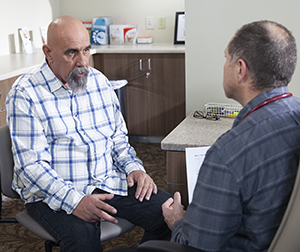Should you be screened for prostate cancer every year? Even if you have no symptoms? Experts disagree. Here are some things to think about as you make this decision. Be sure to talk with your healthcare provider, too. This is so you can make the choice that's right for you.
Why prostate cancer screening is under debate
Not all healthcare providers agree that prostate cancer screening is useful. This is because:
-
PSA test results are not always right. In some cases, the PSA test can have false-positive or false-negative results.
-
A false-positive means that test results show a person may have cancer when they don’t. This can lead to more tests, which can lead to stress and possible risks from the tests.
-
A false-negative means that test results don't show cancer when a person really has it. This can mean you don't get the other tests or the treatment you need.
-
-
Finding prostate cancer early may not be helpful. Even if screening does help find cancer early when it's small, prostate cancer often grows slowly. It also mostly affects older people. This means that finding it early and treating it may not lead to a longer life. Many people with prostate cancer die years later of other causes. They may never have symptoms or be treated for the cancer.
But tests used today can’t always tell which cancers are likely to grow fast and should be treated. And even if a cancer grows slowly, a person may want it treated. Treatment for prostate cancer can cause major side effects. These include erection problems (erectile dysfunction) and lack of urine control (incontinence).
Talking with your healthcare provider
Experts advise you to talk with your healthcare providers about the pros and cons of prostate cancer screening. Have this talk at age 50 if you are at average risk for prostate cancer. Have this talk earlier at age 40 if you are at higher risk for prostate cancer. This can help you make the right decision for you. Ask any questions you have about screening. Talk with your healthcare provider about:
-
Your personal risk for prostate cancer. This is based on your age, race, and family history.
-
What the screening test results can and can’t tell you
-
What the next steps would be if the test results show you might have prostate cancer
-
What your choices would be for treating or not treating the cancer right away
-
What your treatment choices would be and what the side effects might be
Featured in


